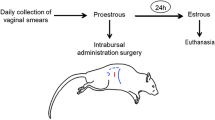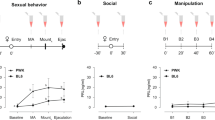Abstract
THE antigonadal role of prolactin during the post-partum period seems well established in many species1–3. But mechanisms by which prolactin may act are not yet known. There is some evidence that prolactin may exert its inhibitory function at the ovarian level4,5, but an eventual action on the hypothalamo–hypophysial axis cannot be excluded. Experiments described here have been designed to resolve this problem.
This is a preview of subscription content, access via your institution
Access options
Subscribe to this journal
Receive 51 print issues and online access
$199.00 per year
only $3.90 per issue
Buy this article
- Purchase on Springer Link
- Instant access to full article PDF
Prices may be subject to local taxes which are calculated during checkout
Similar content being viewed by others
References
Tyson, J. E., Khojandi, M., Huth, J., Smith, B., and Thomas, P., Am. J. Obstet. Gynec., 121, 375–379 (1975).
Lu, K. H., et al., J. Endocr., 68, 241–250 (1976).
Kann, G., and Martinet, J., Nature, 257, 63–64 (1975).
Zarate, A., Canales, E. S., Soria, J., Ruiz, F., and McGregor, C., Am. J. Obstet. Gynec., 112, 1130–1132 (1972).
McNatty, K. P., Sawyers, R. S., and McNeilly, A. S., Nature, 250, 653–655 (1974).
Kann, G., 5th Int. Congr. Endocr. Hamburg, Abstr., 611 (1976).
Kann, G., C. r. hebd. Séance. Acad. Sci., Paris, 272, 2808–2811 (1971).
Kann, G., C. r. hebd. Séance. Acad. Sci., Paris, 272, 2934–2937 (1971).
Kann, G., Habert, R., and Denamur, R., C. r. hebd. Séance. Acad. Sci., Paris, 276, 1321–1324 (1973).
Thorner, M. O., McNeilly, A. S., Hagan, C., and Besser, G. H., Britt. med. J., 2, 419–422 (1974).
Del-Pozo ., et al., J. clin. End. Met., 39, 18–26 (1974).
Valcke, J. C., et al., Ann. Endocr., 35, 423–443 (1974).
Maneckjee, R., Srinath, B. R., and Mougdal, N. R., Nature, 262, 507–508 (1976).
Glass, M. R., Shaw, R. W., Logan-Edwards, R., Butt, W. R., and London, D. R., Int. Symp. Hvpoth. Endocr. Functions, Québec Abstract 21 (1975).
Aono, T., Miyake, A., Shioji, T., Kinugasa, T., Onishi, T., and Kurachi, K., J. clin. End. Met., 42, 696–702 (1976).
Yen, S. S. G., Siler, T. M., Van Den Berg, C., and Ehara, Y., Adv. Biosci., 15, 163–179 (1975).
Fink, G., Aiyer, M. G., Jamieson, M. G., and Chiappa, S. A., in Hypothalannc Hormones, (edit. by Motta. M., Crosignani. P. G., and Martini. L.), 139–160 (1975).
Author information
Authors and Affiliations
Rights and permissions
About this article
Cite this article
KANN, G., MARTINET, J. & SCHIRAR, A. Impairment of luteinising-hormone release following oestrogen administration to hyperprolactinaemic ewes. Nature 264, 465–466 (1976). https://doi.org/10.1038/264465a0
Received:
Accepted:
Issue Date:
DOI: https://doi.org/10.1038/264465a0
Comments
By submitting a comment you agree to abide by our Terms and Community Guidelines. If you find something abusive or that does not comply with our terms or guidelines please flag it as inappropriate.



